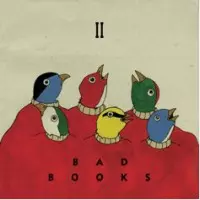The central issue with the first album by Bad Books–a band formed with immediate zine attention on it thanks to its existence comprising strictly of singer/songwriter Kevin Devine and alternative favorites Manchester Orchestra–was merely its failure to establish an identity separate from that of its members' full-time projects. Not to say that 2010's self-titled debut was bad–hardly. It simply felt more like a collection of leftover tunes by Devine and Manchester with a consistent recording tone, but less a wholly collaborative effort. The sophomore try, however, yields more logical results. Bad Books now sounds like a band, and on II, the band wear their new colors brightly.
II doesn't deviate much from the style occasionally forged on the prior album; it does focus on it far more often, however. The band tap deeply into their '90s indie rock staple influences (Built to Spill, Pavement, maybe Guided by Voices at times), using fuzz, playfulness and quirk to construct dirty, versatile pop songs with a host of memorable moments, while seemingly remaining personal to the respective' members topical issues. First single "Forest Whitaker" is an electronic-addled indie pop cut with a musically lighthearted vibe and a contradictory, disconcerting hook ("I know you hate me too / Always say you do."). Devine utilizes "It Never Stops" to momentarily analyze his hometown Brooklyn's hipster homogenization ("McCarren Park when the culture crashed down / Copy after copy 'til the color washed out.").
While the band occasionally makes it clear just who is in Bad Books, it's less blatant than the debut. "Pyotr" is vintage Hull–a stripped-down little Vanderslice of heaven. "Friendly Advice" borrows the opening strum of Devine's "Cotton Crush," but it's Hull's vocals that then usher in a somewhat tension-laced halftime track that never quite resolves itself.
II remains at least interesting through its quieter back half, with Hull following Devine's barely twangy "Petit Mort" with a pair of slower, narrative-heavy tracks in "42" and "Lost Creek," seemingly breaking down the album piece by piece. Devine's acoustic closer "Ambivalent Peaks" is joined by Hull's subtle harmonizing.
Time together has proven fruitful for Bad Books, a collection of musicians who are already pretty individually prolific. But now, instead of merely turning in songs we probably would have heard anyway, there's something far more unique here, giving heavy stock to that whole-being-greater-than-the-parts thing.
STREAM
II
